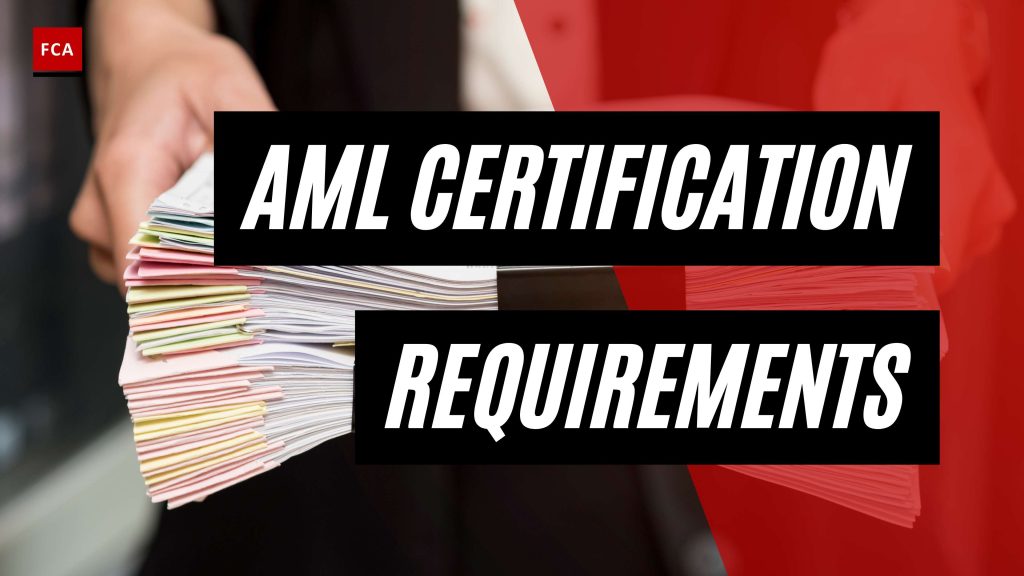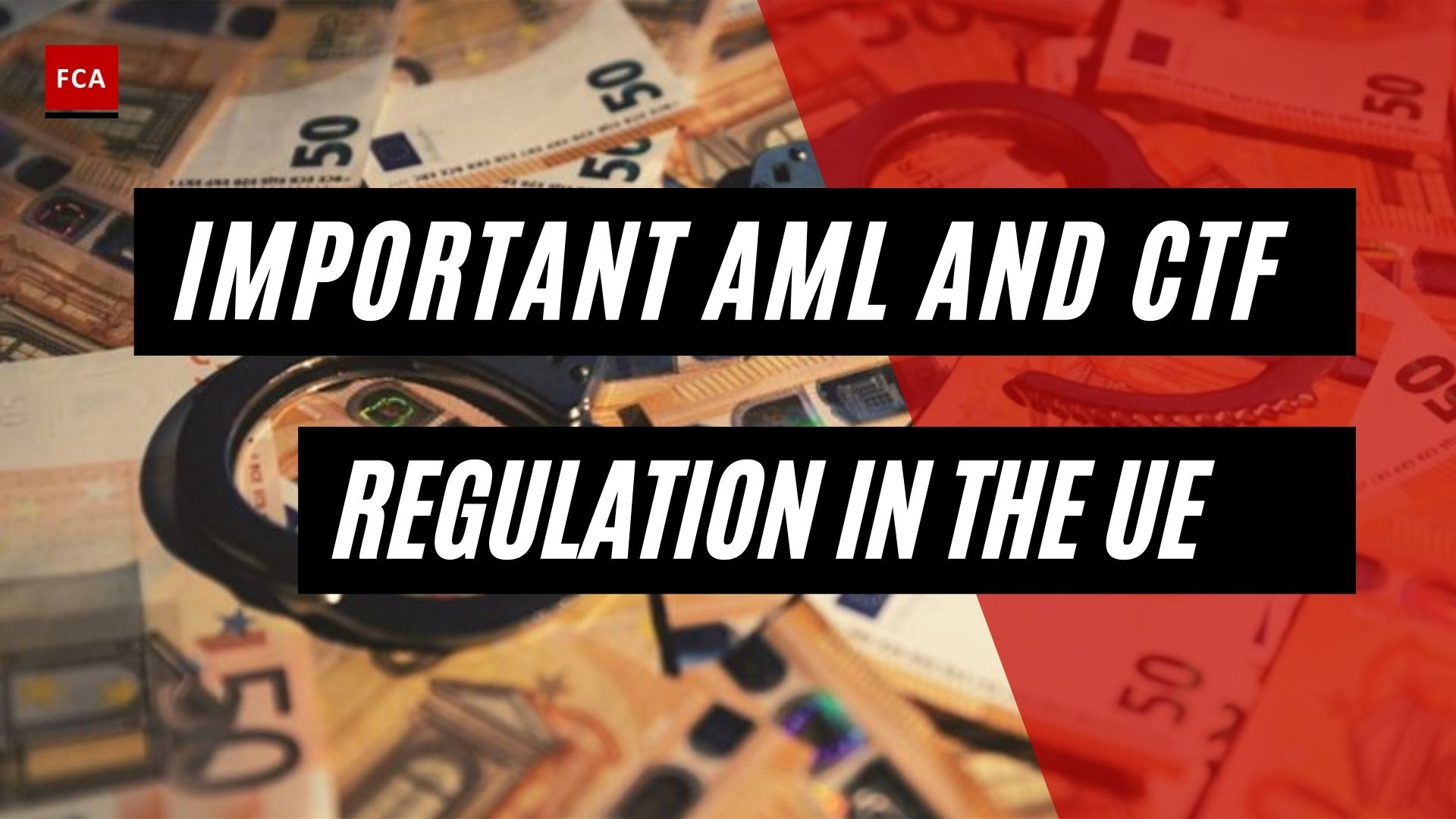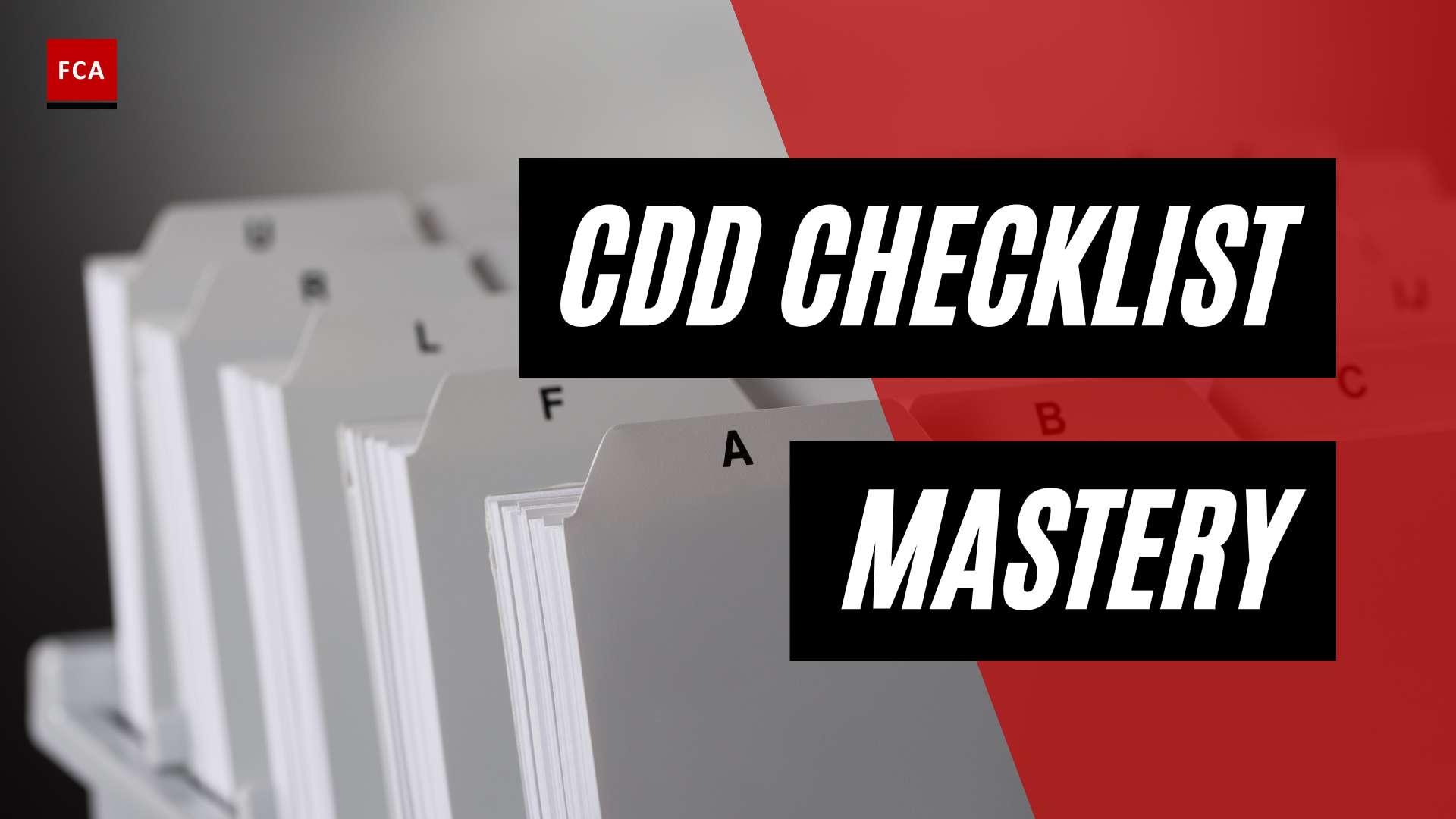AML Certification: An Overview
In the world of Anti-Money Laundering (AML) professionals, obtaining AML certification is a critical step towards advancing one’s career and demonstrating expertise in the field. AML certifications validate an individual’s knowledge and skills in detecting, preventing, and reporting money laundering activities. This section provides an overview of the importance of AML certification and introduces the different types of certifications available.
The Importance of AML Certification
AML certification holds significant importance for professionals working in the field of financial crime prevention. It serves as evidence of an individual’s commitment to staying up-to-date with the latest industry standards, regulations, and best practices. AML certification not only enhances job prospects but also instills confidence in employers, clients, and regulatory bodies.
Moreover, AML certification equips professionals with the necessary skills and knowledge to effectively identify suspicious activities, conduct investigations, and ensure compliance with AML laws and regulations. It demonstrates an individual’s dedication to maintaining the integrity of the financial system and safeguarding against illicit financial activities.
Different Types of AML Certifications
There are several reputable AML certifications available, each focusing on various aspects of AML and catering to different professional goals. Some of the most recognized AML certifications include:
| Certification | Description |
|---|---|
| Certified Anti-Money Laundering Professional (CAMP) | The CAMP certification is widely recognized and focuses on the detection and prevention of money laundering activities. It covers topics such as AML laws, regulations, risk assessment, customer due diligence, and transaction monitoring. CAMP certification is suitable for professionals involved in AML compliance, risk management, and law enforcement. |
| Certified Anti-Financial Crime Professional | The CFCP certification combines the study of both AML and fraud prevention. It encompasses areas such as fraud detection, investigation techniques, risk management, and regulatory compliance. CFCP certification is suitable for individuals working in roles that require a comprehensive understanding of both AML and fraud prevention, such as fraud analysts and AML investigators. |
| Certified Audit and Investigations Professional (CAIP) | The CAIP certification is designed for professionals involved in auditing AML programs and ensuring compliance. It focuses on auditing techniques, controls assessment, regulatory requirements, and program effectiveness. CAIP certification is suitable for individuals responsible for assessing and enhancing AML program integrity and effectiveness. |
Choosing the right AML certification depends on factors such as professional goals, job responsibilities, and areas of interest. It is important to carefully evaluate the requirements and content of each certification to ensure alignment with individual career aspirations. Additionally, continuing education and professional development play a crucial role in maintaining AML certification and staying updated with the evolving landscape of financial crime prevention.
By pursuing AML certification, professionals can demonstrate their commitment to maintaining the highest standards of AML knowledge and skills. This not only enhances their professional standing but also contributes to the collective effort in combating money laundering and protecting the integrity of the global financial system.
Core Knowledge and Skills
To excel in the field of Anti-Money Laundering (AML), professionals need to possess a strong foundation of knowledge and a specific set of skills. This section explores three essential areas of expertise required for AML professionals: understanding money laundering, knowledge of AML laws and regulations, and investigation and analysis skills.
Understanding Money Laundering
A fundamental aspect of AML is having a comprehensive understanding of money laundering. AML professionals must be familiar with the different stages of the money laundering process, including placement, layering, and integration. They should also be able to identify the red flags and indicators that suggest potential money laundering activities.
Having knowledge of the various money laundering techniques, such as smurfing, structuring, and trade-based laundering, is crucial for effective detection and prevention. This understanding enables AML professionals to recognize suspicious transactions and patterns that may require further investigation.
Knowledge of AML Laws and Regulations
AML professionals must have a deep understanding of the laws and regulations that govern anti-money laundering efforts. This includes knowledge of national and international AML regulations, such as the Bank Secrecy Act (BSA) in the United States and the Financial Action Task Force (FATF) recommendations on AML.
Being well-versed in these regulations ensures compliance with legal requirements and facilitates the implementation of effective AML programs. AML professionals should stay up to date with the evolving regulatory landscape to adapt their strategies and practices accordingly. For more information on AML regulations, you can refer to our article on AML regulations knowledge.
Investigation and Analysis Skills
Strong investigation and analysis skills are essential for AML professionals to effectively identify and assess potential money laundering activities. These skills enable professionals to conduct thorough investigations, analyze complex financial transactions, and follow the money trail.
AML professionals should be proficient in gathering and evaluating evidence, conducting interviews, and utilizing advanced tools and techniques for financial analysis. They should also possess critical thinking and problem-solving abilities to connect the dots and recognize patterns that may indicate suspicious behavior.
Moreover, proficiency in using AML software and tools is crucial for efficient data analysis and reporting. AML professionals should be adept at utilizing software solutions to identify and track suspicious transactions. For more information on AML software proficiency, you can refer to our article on AML software proficiency.
By honing their understanding of money laundering, staying abreast of AML laws and regulations, and developing strong investigation and analysis skills, AML professionals can play a vital role in combating financial crimes. These core knowledge and skills form the foundation for a successful career in the field of AML.
Professional Experience
When pursuing an AML certification, professional experience plays a crucial role in demonstrating your expertise in the field. A strong background in financial services, compliance, or risk management is highly valued by employers and certification bodies.
Experience in Financial Services
Having experience in the financial services industry is advantageous for individuals seeking AML certification. This experience provides a solid foundation and understanding of the financial systems and processes involved in detecting and preventing money laundering activities. Professionals with experience in roles such as banking, investment, or insurance have exposure to customer transactions, account management, and financial products. This background knowledge can be invaluable when analyzing and identifying suspicious activities that may be indicative of money laundering.
Experience in Compliance or Risk Management
Experience in compliance or risk management is another valuable asset for individuals pursuing AML certification. Compliance professionals are responsible for ensuring that organizations adhere to relevant laws, regulations, and internal policies. They develop and implement AML programs, perform risk assessments, conduct due diligence, and provide training to employees. This experience equips individuals with the necessary skills to identify potential AML risks and effectively mitigate them.
AML certification bodies often require a minimum number of years of professional experience in these fields to qualify for certification. This ensures that candidates have practical knowledge and exposure to the complexities of AML compliance.
By combining experience in financial services with expertise in compliance or risk management, professionals can develop a well-rounded skill set that is highly sought after in the AML industry. It is important to highlight and showcase this experience when applying for AML certification to demonstrate your practical knowledge and understanding of the field.
For more information on the specific skills required for AML professionals, you can refer to our articles on anti-money laundering skills, aml analyst skills, aml investigator skills, and aml professional skills. These resources will provide you with valuable insights into the competencies needed to excel in the AML field.
AML Certification Requirements
To obtain an AML certification, individuals must meet certain requirements that demonstrate their knowledge, experience, and commitment to combating money laundering. The requirements generally encompass education, professional experience, and the need for continuing education to stay updated with evolving AML practices.
Education and Academic Qualifications
AML certification programs typically require candidates to have a minimum level of education. This can vary depending on the certification body or program. Common academic qualifications include a high school diploma, associate’s degree, or bachelor’s degree in a relevant field such as finance, accounting, or criminal justice.
In addition to formal education, some certifications may have specific coursework requirements related to anti-money laundering. These courses provide candidates with a comprehensive understanding of money laundering techniques, AML laws and regulations, and the tools used to detect and prevent illicit financial activities.
Professional Experience and Work History
Professional experience is a critical component of AML certification requirements. Certification programs generally require candidates to have a certain number of years of experience working in fields related to financial services, compliance, risk management, or law enforcement.
The required years of experience can vary depending on the certification program and the level of certification sought. For example, entry-level certifications may require a minimum of one to three years of relevant experience, while higher-level certifications may require five or more years of experience in AML-related roles.
Candidates are often expected to demonstrate their experience through a detailed work history, including information about their roles, responsibilities, and accomplishments in combating money laundering.
Popular AML Certifications
To excel in the field of Anti-Money Laundering (AML), obtaining the right certification can significantly enhance your professional credentials. There are several reputable AML certifications available, each designed to validate your knowledge and expertise in combating money laundering activities. Here are three popular AML certifications that professionals often pursue:
Certified Anti-Money Laundering Professional (CAMP)
The Certified Anti-Money Laundering Professional (CAMP) certification offered by Financial Crime Academy (FCA) is widely recognized and respected in the AML industry. This certification program designed to arm individuals with the expertise needed to navigate the complexities of AML compliance effectively. Let’s delve into why obtaining this certification is invaluable for professionals operating in roles related to AML compliance, investigations, or risk management.
One of the standout features of CAMP certification is its expansive coverage of essential topics within the realm of AML and CTF. From Anti-Money Laundering Know Your Customer (AML KYC) foundations to AML/CTF Suspicious Activity Reports, the curriculum leaves no stone unturned. Participants gain a deep understanding of the regulatory landscape, detection techniques, and reporting requirements crucial for combating financial crimes.
CAMP certification is a badge of excellence for individuals engaged in AML compliance, investigations, or risk management. Its comprehensive curriculum, industry recognition, and career-enhancing potential make it a valuable investment for professionals looking to make a meaningful impact in combating financial crime. By obtaining CAMP certification, professionals not only bolster their skill set but also contribute to the collective effort of safeguarding the integrity of the global financial system.
Certified Anti-Financial Crime Professional (CFCP)
In the ever-evolving landscape of financial crime prevention, professionals need to stay ahead of the curve to safeguard against increasingly sophisticated threats. Financial Crime Academy offers the Certified Anti-Financial Crime Professional (CFCP) certification tailored for individuals seeking expertise in both Anti-Money Laundering (AML) and fraud prevention.
The Certified Anti-Financial Crime Professional certification is meticulously crafted to equip professionals with the skills and knowledge necessary to combat financial crimes effectively. Covering a diverse range of topics, including Certificate in Countering Illegal Wildlife Trade, Certificate in Anti Bribery and Corruption, Certificate in Cryptoasset Financial Crime Compliance, Certificate in Anti-Financial Crime Compliance, this certification ensures a holistic understanding of the intricacies involved in AML and fraud prevention.
The Certified Anti-Financial Crime Professional (CFCP) certification offered by the Financial Crime Academy fills a crucial gap in the realm of AML and fraud prevention. Its comprehensive curriculum, industry relevance, and potential for career advancement make it an invaluable asset for professionals seeking to make a meaningful impact in combating financial crime. By obtaining CFCP certification, professionals not only bolster their individual skill set but also contribute to the collective effort of safeguarding the integrity of the global financial system.
Certified Audit and Investigation Professional (CAIP)
In the realm of Anti-Money Laundering (AML) compliance, the effectiveness of audit and investigation processes is paramount. The Financial Crime Academy offers the Certified Audit and Investigation Professional (CAIP) certification. Tailored for individuals tasked with auditing AML programs and controls, this certification equips professionals with the skills and knowledge needed to assess and enhance the effectiveness of AML processes.
The CAIP certification is meticulously designed to cater to the specific needs of professionals involved in auditing AML programs and controls. By focusing on assessing the effectiveness of AML processes and identifying areas for improvement, this certification enables individuals to play a pivotal role in enhancing the overall compliance framework within their organization.
The certification program covers a wide range of topics essential for auditing AML programs effectively. Participants delve into areas such as Fraud Detection and Investigation Foundations, Internal Investigations, Forensic Accounting, Counter-Terrorist Financing, Fraud Risk Management, Digital Forensics, and eDiscovery. This comprehensive curriculum ensures that CAIP-certified professionals are equipped with the requisite knowledge and skills to navigate complex audit and investigation scenarios.
In an environment where regulatory scrutiny of AML compliance is intensifying, holding a recognized certification can significantly enhance career prospects. The CAIP certification offered by the Financial Crime Academy is widely respected within the industry, signaling to employers and stakeholders that an individual possesses the specialized skills needed for auditing AML programs and controls. This industry recognition opens doors to a myriad of career opportunities and facilitates professional growth and advancement.
When considering which AML certification to pursue, it’s important to evaluate your career objectives, current role, and the specific skills and knowledge you wish to acquire. Additionally, it’s beneficial to research the requirements, examination format, and recertification criteria for each certification to make an informed decision. For more information on the skills required for AML professionals, refer to our articles on anti-money laundering skills and aml career skills.
Choosing the Right AML Certification
When it comes to pursuing an AML (Anti-Money Laundering) career, obtaining the appropriate certification is essential. With several AML certifications available, it’s important to carefully consider your options before making a decision. Here are some key considerations and factors to keep in mind when selecting an AML certification.
Considerations for Certification Selection
- Relevance to Your Role: Consider the specific AML role you are interested in pursuing, such as an AML analyst, investigator, or compliance officer. Look for certifications that align with the skills and knowledge required for that particular role. You can refer to our articles on AML analyst skills, AML investigator skills, and AML compliance skills for more information.
- Recognized and Respected: Research the reputation and recognition of the certification within the AML industry. Look for certifications that are widely recognized and respected by employers and regulatory bodies. This can enhance your professional credibility and increase your chances of career advancement.
- Content and Curriculum: Review the content and curriculum of the certification program. Ensure that it covers the necessary knowledge areas, such as AML regulations, reporting techniques, and software proficiency. You can refer to our articles on AML regulations knowledge and AML reporting skills for more details.
- Cost and Accessibility: Consider the cost of obtaining the certification, including exam fees and any additional study materials. Assess the accessibility of the certification program, such as whether it is available online or requires in-person attendance.
Factors to Keep in Mind
- Industry Reputation: Look for certifications that are recognized and valued by prominent industry organizations, such as FCA (Financial Crime Academy). These organizations often offer well-regarded certifications, such as the Certified Anti-Money Laundering Professional (CAMP), Certifies Anti-Financial Crime Professional (CFCP) and Certified Audit and Investigations Professional (CFCP).
- Career Goals: Consider your long-term career goals. Some certifications may be more suitable for entry-level roles, while others may be designed for more advanced professionals seeking specialized knowledge. Align your certification choice with your career aspirations.
- Continuing Education: Evaluate the continuing education requirements of the certification. Some certifications require ongoing professional development to maintain the credential. Assess whether you are willing and able to fulfill these requirements to ensure the continued validity of your certification.
- Networking Opportunities: Explore whether the certification program provides networking opportunities, such as conferences or online forums, where you can connect with other AML professionals. Networking can be valuable for learning from others in the field and expanding your professional connections.
By carefully considering these factors, you can choose an AML certification that suits your career goals, enhances your knowledge and skills, and increases your marketability as an AML professional. Remember to conduct thorough research and seek guidance from industry professionals to make an informed decision.









